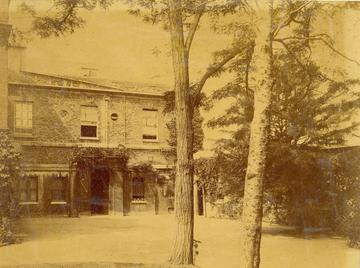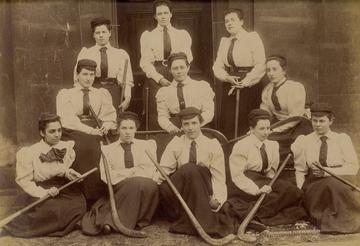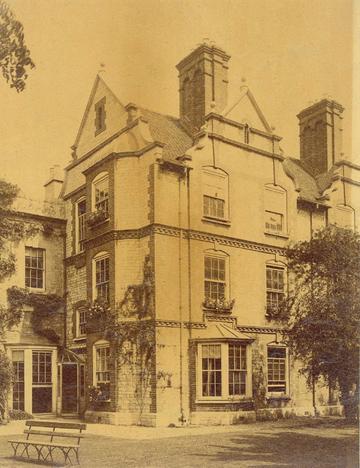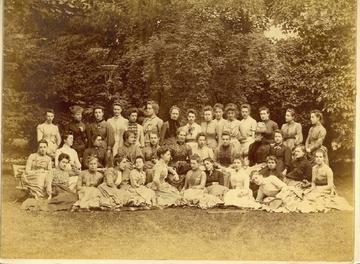The Universities Tests Act of 1871, in opening up the University to non-Anglicans, paved the way for Somerville College to be non-denominational at its foundation in 1879. It was in 1878 that forward-thinking men and women came together to plan the first Oxford ‘college’ for women. A schism soon broke out however as some members of the group were adamant that the college should be non-denominational whereas others were equally adamant that it should be for Anglicans only. The non-denominational contingent broke away and formed Somerville Hall (later College), leaving the rest of the group to form Lady Margaret Hall as an Anglican institution. Both institutions opened their doors to students in 1879.

Walton House, Somerville College, Oxford, c.1890.
Following the Universities Tests Act, several new colleges, not affiliated to the Church of England, had been founded but these were for specific denominations. Somerville’s non-denominationalism enabled it to open its doors to people of any faith or none. The college had no chapel for the first 55 years of its existence (unthinkable before the 1871 Act) and when a strong-minded ecumenist donor produced funds for such a building it was under the condition that it was to be a ‘House of Prayer for all Peoples’ and this phrase was carved in stone above the entrance.

Somerville College hockey team c.1892.
The early registers from the nineteenth century reveal the range of students accepted and the mix of beliefs co-existing in the same institution. Just a few of the different denominations: Congregationalist, Episcopalian, Unitarian, Presbyterian, United Congregational, Church of Scotland, Society of Friends, German Reformed, Baptist, Wesleyan Methodist, Free Church of Scotland, Zwinglian, Roman Catholic, Methodist New Connexion, New Swedenborgian, Jewish and Armenian Catholic members of college, plus several listing no church at all and one who appears to have moved from the Church of England to the Congregationalists.

Somerville College House c.1900.
The non-denominational and diverse character of the College also enabled it quickly to develop a strong international character. Reaching out to the international community, including those forced to flee from violence or persecution in their own countries, has been a strong driver for Somerville throughout its history. From raising funds for Cornelia Sorabji to come to Oxford in 1889, through providing space and jobs for fleeing Jewish academics in the 1930s, campaigning and raising funds for Hungarian, South African, Czechoslovakian and Chilean students at times of crisis throughout the twentieth century and in 2021 becoming, with Mansfield, the first college in Oxford to be awarded College of Sanctuary status.

Somerville College Photograph, 1889.
Somerville’s unofficial motto is ‘including the excluded’ and it has long abided by this, seeking to challenge the status quo and support nonconformity in its widest sense. Without the Tests Act of 1871, the first council members would have had no grounds to break away from their Anglican colleagues and Somerville might never have been.
Jan Royall, Baroness Royall of Blaisdon, Principal of Somerville College, Oxford.